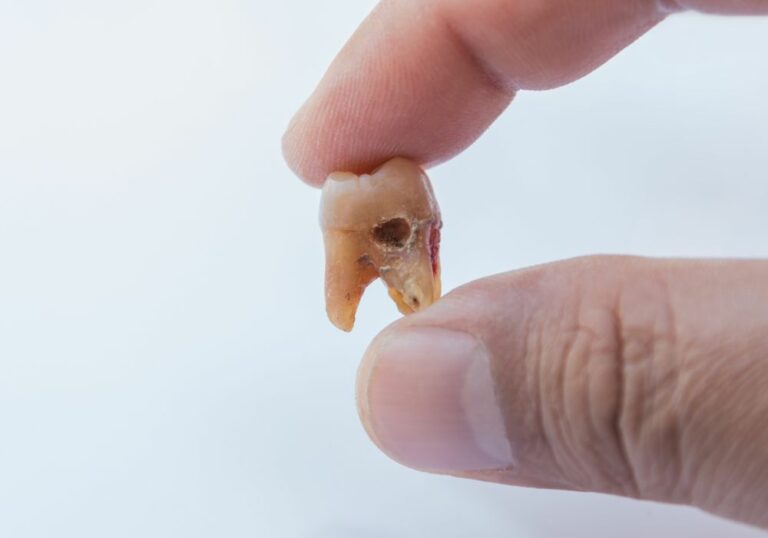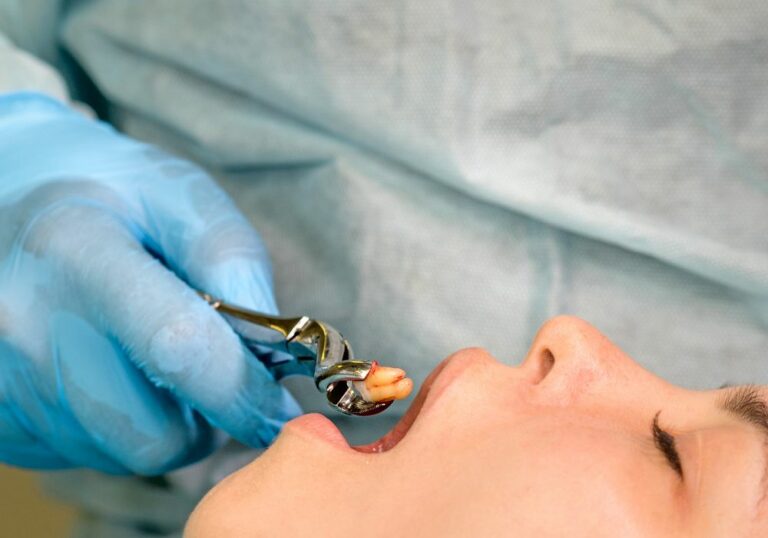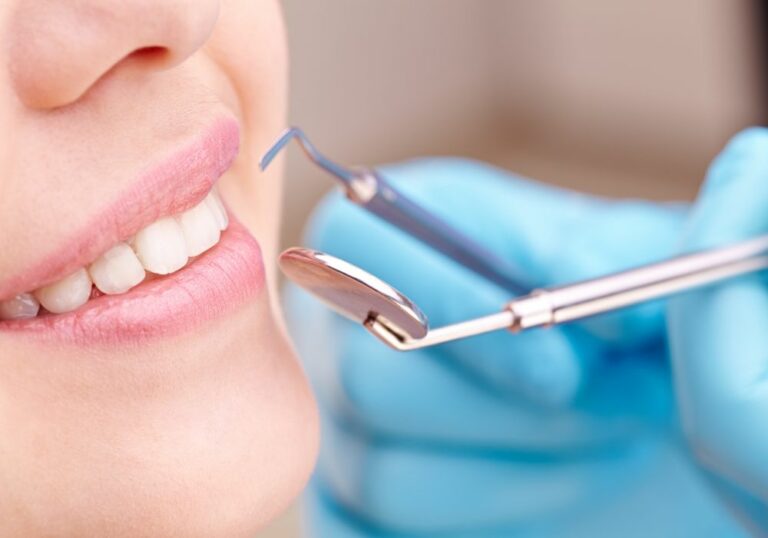Having dental problems can negatively impact both your oral health and self-esteem. But while dealing with tooth decay, loss, discoloration, or other issues is frustrating, you should not feel shame or embarrassment. Many factors beyond your control affect dental health. With compassionate care, even severe tooth troubles can be remedied for a beautiful smile you feel confident about.
Common Causes of Poor Dental Health
Don’t blame yourself too harshly for having bad teeth. The causes are often out of your hands entirely. Reasons beyond basic hygiene that contribute to poor oral health include:
- Genetics and tooth alignment inherited from parents
- Developmental dental disorders present from childhood
- Chronic medical conditions and corresponding treatments
- Substance abuse altering oral pH balance
- Mental health conditions making self-care difficult
- Financial barriers to professional care
- Lack of education about proper dental practices
- Insufficient access to nutrient-rich foods
- Past trauma or injury damaging teeth
- Normal wear as you age
As you can see, individual dental problems arise for diverse reasons, many of which are outside your control. Don’t assume cavities, discoloration, or tooth loss mean you necessarily had bad habits. Have compassion for yourself and the multiple factors involved.
Is Oral Health Connected to Hygiene?

Maintaining oral hygiene through daily brushing, flossing, healthy eating, regular dental visits, and avoiding smoking does help prevent certain issues and promote tooth longevity. Patients with diligent habits tend to have less:
- Cavities
- Gum disease
- Tartar buildup
- Bad breath
But even the most conscientious hygiene cannot fully prevent inevitable enamel wear, developmental variations in tooth alignment or structure, changes from medical conditions and treatments, or natural aging effects like receding gums.
Don’t underestimate hygiene, but also don’t blame yourself if dental problems occur despite your best efforts. Many elements you can’t control impact your smile over a lifetime.
Letting Go of Dental Shame
Feeling embarrassed or self-conscious about the appearance of your teeth is understandable but unnecessary. Here are perspectives to help you move past shame:
- Consider the diversity of smiles – Just like individual faces, imperfect teeth are what make your smile unique to you. Embrace this diversity.
- Recognize uncontrollable factors – Your dental story includes influences out of your hands. Release self-blame about what you “should” have done.
- Shift focus to health – Prioritize managing pain, infections, and tooth longevity rather than just aesthetics. These aspects matter most.
- Know problems can be fixed – Thanks to modern dentistry, even severe issues like missing teeth can be repaired for complete function and beauty.
- You are more than your teeth – Your character, intellect, talents, and values all remain unchanged, regardless of dental flaws.
- With self-compassion and professional treatment, you can gain confidence about your oral condition over time. Stay positive on the journey to healthier teeth.
Improving Your Dental Health

If you currently have lackluster oral health, take heart that your situation can likely improve greatly. Options to restore your teeth’s function and aesthetics include:
Professional Cleanings
Regular dental cleanings remove built-up calculus, tartar, and stains you can’t eliminate with daily hygiene. Deep cleanings also treat gum disease.
Fillings and Onlays
Damaged areas of teeth can be repaired with bonded composites, porcelain, or metal materials to look and function like healthy enamel again.
Crowns
Caps made from porcelain, ceramic, or metal prosthetics can fully cover broken, worn, or discolored teeth for strength, shape, and whiteness.
Bridges and Implants
Missing teeth can be replaced with dental bridges attached to neighboring teeth or custom titanium root implants supporting realistic false teeth.
Veneers and Bonding
Thin facings or direct composite resins disguise chips, gaps, stains, and irregularities for even alignment and color.
Tooth Whitening
Both professional bleaching and at-home trays with peroxide gel lighten all teeth shades for a glowing smile.
With your dentist’s help, significant tooth troubles don’t have to lower your confidence long term. A variety of solutions can restore comfort, function, and aesthetics.
Supporting Overall Wellness

While dentists treat current dental issues, improving overall health also benefits your teeth:
- Quit smoking – Kicking nicotine habits protects against gum disease and oral cancer risks.
- Adopt hygiene habits – Brush twice and floss once daily, even with dental work present.
- Prioritize dental visits – See your dentist every 6 months for optimal prevention and monitoring.
- Improve nutrition – Eat a balanced diet low in sugars with fruits, vegetables, lean proteins, and water.
- Manage chronic illnesses – Follow treatment plans for conditions like diabetes that increase dental risks.
- Consider supplements – Ask your doctor if vitamin D, probiotics, or other supplements may help.
- Reduce stress – Manage stress levels through healthy coping tactics to avoid teeth grinding and clenching.
With whole body wellness in mind, your dental health can thrive through comprehensive lifestyle approaches.
When to Seek Help
Consult your dentist promptly if you notice:
- Significant tooth pain, sensitivity, or bleeding gums
- Loose, shifting, or cracked teeth
- New indentations, spots, or lesions in the mouth
- Chronic bad breath or foul tastes that don’t resolve with brushing
- Major aesthetic changes to tooth color, alignment, or retention
- Any mouth or jaw injury from trauma or accident
- Growths, swelling, or abnormal numbness
Don’t delay seeking help, even if you feel embarrassed. Catching problems early increases treatment success rates and reduces complications. Most dental issues become more complex and difficult to remedy if left unaddressed.
Frequently Asked Questions
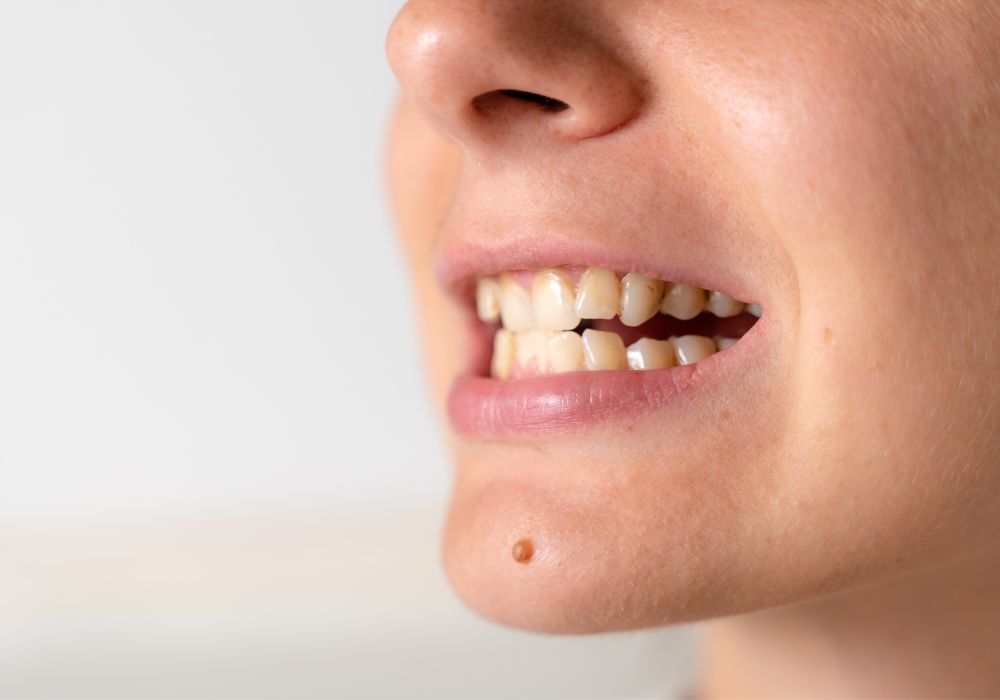
Here are answers to some common questions about poor dental health:
What if I can’t afford dental treatment right now?
Ask your dentist about payment plans or applying for medical credit with low monthly payments. Free or discounted services are available from dental schools and clinics also.
Why do my teeth look yellow even when I brush?
Discoloration inside the tooth structure won’t brush away. Intrinsic stains and aging effects require professional whitening to reverse. Avoid overbrushing, which can wear away enamel.
Why do my gums bleed when I floss?
Sensitive, inflamed gums that bleed easily signify gingivitis, the early stage of gum disease. See your dentist for deep cleaning and start flossing gently every day.
Can smoking cannabis cause tooth damage?
Yes. Like tobacco, cannabis smoke increases gum disease risks. It also causes dry mouth, which raises the risk of cavities. Stopping smoking is ideal, but frequent hydration and hygiene help if you continue usage.
Is it possible to reduce tooth sensitivity?
Yes. Your dentist can recommend special toothpastes for sensitivity, as well as dental sealants and fillings to cover exposed roots and block external stimuli triggering pain.
The key is to not isolate yourself out of shame. With professional help and self-care, your situation can improve for healthier comfort and confidence.
Key Takeaways
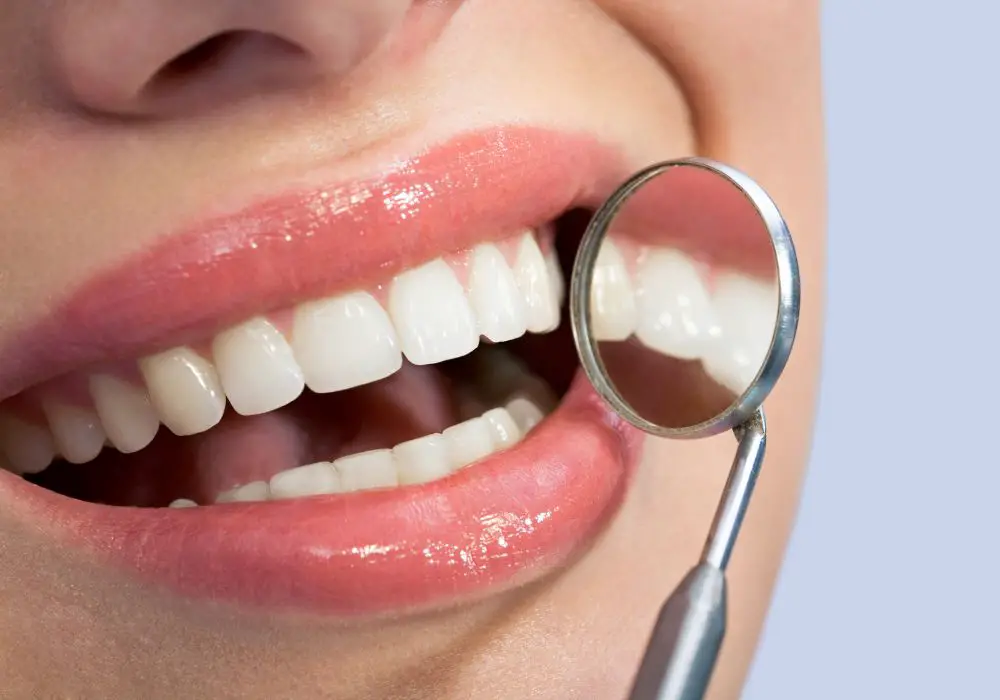
- Don’t assume poor dental health is your fault, as many genetic and lifestyle factors beyond hygiene impact teeth.
- While diligent hygiene prevents certain problems, some enamel wear and oral changes are inevitable with age.
- Let go of embarrassment and focus on managing pain, infections, and restoring function. Aesthetic fixes are also available.
- Improving overall wellness through nutrition, managing illnesses, quitting smoking, and reducing stress also benefits teeth.
- Modern dentistry offers many treatments to repair cavities, replace missing teeth, whiten stains, and remedy cosmetic flaws for an improved smile.
- Seek help promptly if you have tooth pain, damage, or major appearance changes instead of hiding your smile.
You deserve to feel pride in your teeth. With compassionate dental care and daily self-care, you can gain confidence about your oral health over time.
Conclusion
Coping with dental problems like severe tooth decay, loss, discoloration, and misalignment can feel frustrating and embarrassing. But avoiding treatment out of shame only worsens issues. Instead, focus on managing pain and infections to improve function. Cosmetic fixes are also available from dentists to restore your smile’s beauty. Remember that factors like genetics, aging, injury, and chronic illness – not just hygiene – influence oral health over your lifetime. With regular professional care, daily upkeep habits, and overall wellness, your dental situation can get better for a smile you feel happy about. Seek help without judgement so you can feel confident and get the treatment required for healthy teeth and gums.
FAQ
Q1: Can teeth be straightened later in life?
Yes, orthodontic options like Invisalign are available for adults if you didn’t get braces as a child. Talk to your dentist about whether clear aligners, traditional braces, or other orthodontic treatments could help improve your bite and smile.
Q2: What dental benefits should I look for in a health insurance plan?
Choose plans that offer lower deductibles, generous annual maximums, coverage for basic and major services, discounts on cosmetic dentistry, and reduced costs for seeing in-network providers to offset dental treatment costs.
Q3: Can dental implants get infected?
Yes, peri-implantitis is a gum infection that develops around the implant. Symptoms include pain, swelling, and bleeding gums. See your dentist immediately if you notice implant problems since infections can cause implant failure.
Q4: How do I know if I grind or clench my teeth?
Jaw pain, dull headaches, and sore facial muscles upon waking signal nighttime grinding. Chipped teeth, flattened molars, and excessive wear also indicate chronic grinding and clenching. See your dentist for help alleviating this habit.
Q5: What foods help remineralize enamel?
Foods high in calcium like milk, yogurt, and cheese promote enamel strength. Sugar-free gum with xylitol also helps. Consider taking vitamin D and calcium supplements for additional support if needed.
You deserve a healthy, confident smile. With patience and care from dental professionals and yourself, overcoming dental woes is possible.


